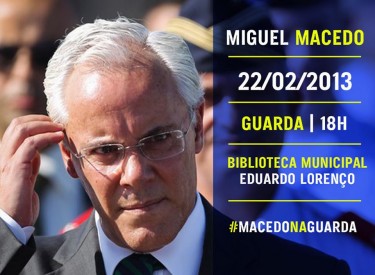This post is part of our Europe in Crisis special coverage.
Thousands of Portuguese people, unhappy with the austerity measures imposed by the government, have promised to again fill the streets of the country on March 2, 2013.
The call for protest is gaining momentum on social networking sites, echoing what happened with the massive protests on September 15, 2012 and March 12, 2011 that helped bring down the last government. A number of protests are organized on Facebook [pt], where messages of discontent are multiplying.
The blog Que Se Lixe a Troika (Screw the Troika) [pt] is collecting appeals for participation in the protest, such as this one [pt] by José João Louro:
Não é tempo para recriminações. Muitos deixaram-se enganar. Agora é um tempo de mobilização contra a apatia e contra a aceitação do sofrimento colectivo. É um tempo de abandonar as televisões e as telenovelas e ir para a rua protestar. É um tempo de participar em todas as manifestações de protesto, sejam convocadas pelos sindicatos ou por pessoas anónimas. Não é tempo de ver quem está ou quem não está, é tempo de estarmos todos.

Poster shared on the page of the event “Screw The Troika. The People are In Charge!”
In an extraordinary move, the country's largest trade union federation, known as the General Confederation of Portuguese Workers, confirmed through its leader Arménio Carlos that union members will also take to the streets “with the people demanding new policies and a change of government”, as can be seen in this video [pt], made available by those in charge of the blog Aventar. The decision is remarkable, given that there is no memory of the union federation ever officially participating in a protest that it or one of its member unions did not organize.
Politicians pursued by song
In spite of the little attention given by mainstream media, the protest came to public's attention thanks to a series of actions designed to stop ministers from speaking in some of their public appearances.
For this, demonstrators have revived a historic song, composed and sung by Zeca Afonso, that was used as the second signal by the revolutionary coup that brought down Portugal's dictatorship on the night of April 25, 1974. The song, Grândola Vila Morena, became a symbol of the revolution and of democracy in Portugal.
The first of these actions actually occurred in the Parliament, when a group of citizens interrupted Prime Minister Pedro Passos Coelho's speech, during the fortnightly debate of February 15, 2013, ignoring appeals by the president of the assembly for them to leave or be quiet [pt]:
The demonstration was praised [es] on Twitter by journalist Jesus Maraña, ex-director of the Spanish newspaper Público and current director of the online newspaper infoLibre, who called it a “beautiful form of protest”.
Subsequently, Adjunct Minister of Parliamentary Affairs Miguel Relvas, whose career has been most controversial, was interrupted twice. First, in Vila Nova de Gaia during a speech [pt] at the Clube dos Pensadores (Thinkers Club), where he even tried to fight the protest, and after, in Lisbon during a conference about the future of journalism organized by the TV station TVI. There, protesters not only sang Grândola Vila Morena, but they also chanted slogans forcing the minister to leave without being able to speak, as can be seen in this video [pt]:
A number of politicians, ex-politicians, and commentators called the actions anti-democratic. First, it was Luís Montenegro, the leader of the Social Democratic party leading the governing coalition, stating to Público newspaper [pt] that:
Não há democracia se os representantes legítimos do povo, por estes eleitos directa ou indirectamente, forem impedidos de expressar o seu pensamento.
Then it was the ex-socialist minister Augusto Santos Silva, who called these behaviors “anti-democratic” and “unacceptable” in an interview [pt] with TVI24 channel. The managing editor of TVI himself, José Alberto Carvalho, said [pt]:
Liberdade de expressão é a liberdade para as pessoas se manifestarem, para protestarem, contestarem, criticarem. A liberdade de expressão termina no momento em que, por excesso dessa liberdade de expressão, impedimos os outros de se manifestarem eles próprios.
Without the privileged space that all of these individuals above enjoy in the media, average and anonymous citizens have not given up on their forms of protest and strategy to silence the ministers.

Poster disseminated on Facebook and Twitter, announcing the presence of Minister of Internal Administration Miguel Macedo in Guarda.
Social networking sites continue to be used to call for actions and disseminate where numerous members of government will be present. Over the final weekend of February 2013, the minister of internal administration in Guarda and the minister of the economy in São João da Madeira were received with the revolutionary song, in spite of an increasing police presence.
The song has already crossed the border into Spain, becoming a symbol of Iberian protest.
Coincidentally, the composer of the song, Zeca Afonso, died 26 years ago, on February 23, 1989. To commemorate the date, Grândola Vila Morena was sung in the Largo do Carmo in Lisbon, the place where the 1974 coup reached its climax.
On YouTube, Lara Sardinha, 34 year-old unemployed interior designer, made a video tribute to the song and dedicated it to “a better Portugal” [pt and en]:







4 comments